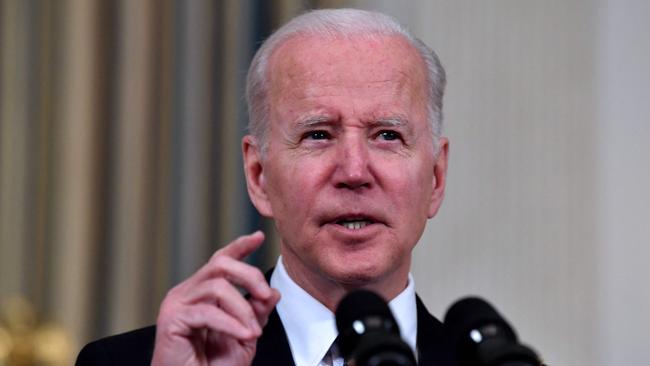US Budget: Biden’s budget calls for rise in defence spending
Joe Biden unveils a new ‘billionaire’s tax’ to reduce the yawning US budget deficit.

Joe Biden has unveiled a new “billionaire’s tax” to reduce the yawning US budget deficit, as part of a US$5.8 trillion 2023 budget blueprint that would boost defence spending, including in the Indo-Pacific, and reverse some of Donald Trump‘s key economic reforms.
Higher proposed taxes would see Washington’s revenues rise to $4.6 trillion in the 2023 fiscal year, which begins on 1 October, from $4.4 trillion in 2022, helping to slash the budget deficit from the $2.8 trillion inherited from the Trump administration to $1.15 trillion (equivalent to around 4.5 per cent of US GDP).
“Budgets are statements of values, and the budget I am releasing today sends a clear message that we value fiscal responsibility, safety and security at home and around the world, and the investments needed to continue our equitable growth and build a better America,” the President said, bringing down the second budget of his administration.
The White House requested $813bn for defence for 2023, a 4 per cent increase over the previous year, which was more than double the requested increase a year earlier, amid increasing calls on US military power to deter and help fend off threats from Russia, China, North Korea and Iran.
“I’m calling for one of the largest investments in our national security in history, with the funds needed to ensure that our military remains the best-prepared, best-trained, best-equipped military in the world,” Mr Biden said on Monday (Tuesday AEDT).
The White House pencilled in $682 million in assistance for Ukraine and another $400 million to counter covert and overt Chinese aggression in the Pacific region as part of a PRC Malign Influence Fund.
“The President has prioritised strategic competition with China and worked with allies and partners to resist coercion and deter aggression from Beijing and Moscow and ended America’s 20-year war in Afghanistan while removing all US troops,” the White House said.
The budget also called for $1.8bn to “support free and open, connected, secure, and resilient Indo-Pacific Region and the Indo-Pacific Strategy”, a document released last month that was overshadowed by Russia’s invasion of Ukraine.
The budget, more akin to a starting point in an annual negotiation with Congress, which controls the purse strings, proposed a controversial tax on unrealised capital gains on America’s richest people, that aims to raise $361bn over the next decade, arguing they pay “pay indefensibly low tax rates”.
“This minimum tax would apply only to the wealthiest 0.01 per cent of households—those with more than $100 million—and over half the revenue would come from billionaires alone. It would ensure that, in any given year, they pay at least 20 per cent of their total income in Federal income taxes,” the White House said.
Washington would also increase the corporate tax rate to 28 per cent, partly reversing one of Donald Trump’s main reforms, which saw the rate fall from 35 per cent to 21 per cent in 2017, and lift the top rate of income tax from 37 per cent to 39.6 per cent, the level that prevailed at the end of the Obama administration.
“While corporate profits have soared their investment in our economy did not: the tax breaks did not trickle down to workers or consumers,” the White House said.
The biggest increases in spending went to health and education, around $350bn extra each over the next decade, including $81bn for health to better prepare for the next pandemic, $36.5bn for low-income schools, and $6.9bn to “protect the oceans and coasts”.
“We’re on track to reduce the deficit by more than $1.3 trillion this year. That’s the largest-ever one-year decline and less than half of the 2020 deficit the President inherited,” a spokesman said.
Appeals to fiscal rectitude reflect the increasingly centrist evolution of the Biden administration amid falling approval ratings for the president and Democrat party as key November Congressional elections approach, and realisation its wafer thin Congressional majority has constrained an earlier more ambitious agenda.
Democrats failed to pass their signature Build Back Better reform agenda last year after one centrist Democrat Senator refused to support the package, which would have increased social, welfare, health and climate change by US$1.8 trillion over the next decade.
In contrast to calls to “defund the police” from high profile Democrats in the wake of George Floyd’s murder in 2020, the administration allocated $32.3bn in grants to states and local governments to put more police officers “on the beat across the nation”.
Federal government outlays, $6.8 trillion in 2021, would decline to $5.8 trillion in 2023, before steadily rising (along with the budget deficit) to $7.5 trillion by 2028, as long standing ‘mandatory’ health and social security programs continued to expand as the population ages.
Controversially, the Biden budget anticipated inflation would decline from 7.9 per cent over the year to February to 2.3 per cent next year and for every year over the next decade.
Federal public debt, around $26 trillion, a little larger than US GDP, would increase steadily to the equivalent of 106 per cent of GDP by 2032, the last year of the budget forecasting period.







To join the conversation, please log in. Don't have an account? Register
Join the conversation, you are commenting as Logout